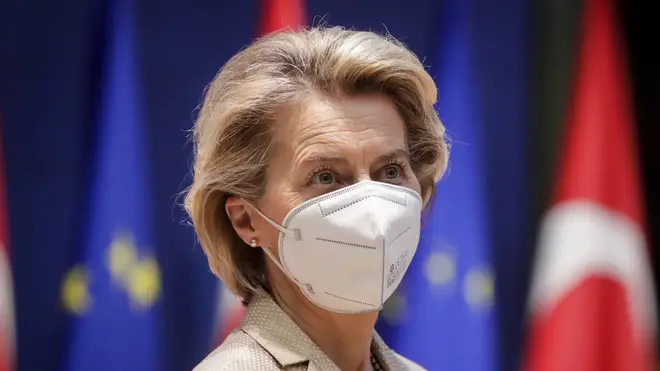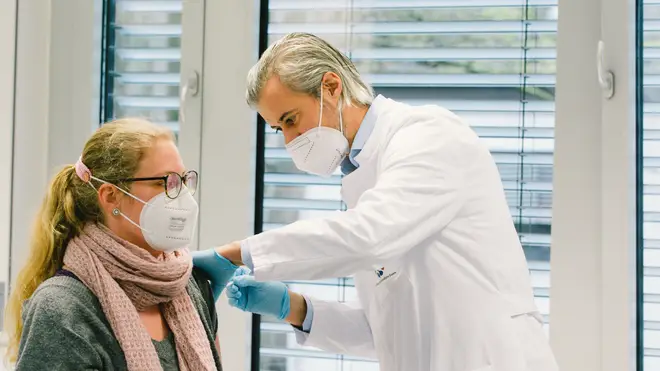
Richard Spurr 1am - 4am
24 March 2021, 13:13 | Updated: 24 March 2021, 22:08

The UK Government and the European Commission have released a joint statement pledging to create a 'win-win' vaccine supply situation.
In the statement released on Wednesday, the UK Government and the European Commission said there will be cooperation in fighting the Covid-19 pandemic.
“We are all facing the same pandemic and the third wave makes cooperation between the EU and UK even more important," the statement reads.
“We have been discussing what more we can do to ensure a reciprocally beneficial relationship between the UK and EU on COVID-19.
“Given our interdependencies, we are working on specific steps we can take - in the short-, medium- and long term - to create a win-win situation and expand vaccine supply for all our citizens.
“In the end, openness and global cooperation of all countries will be key to finally overcome this pandemic and ensure better preparation for meeting future challenges.
“We will continue our discussions.”

Earlier on Friday, President of the European Commission Ursula Von Der Leyen said that "open roads should run in both directions", as the EU announced a new mechanism based on the "principles of reciprocity and proportionality" for authorising the export of vaccines.
It comes as a stockpile of 29 million doses of the AstraZeneca vaccine were discovered by authorities in Italy, which local reports have claimed were destined for the UK, but were stopped under the mechanism.
However, the pharmaceutical firm later rejected the term "stockpile", saying that 16 million of the jabs are waiting "for quality control clearance after the filling of vials is completed". The other 13 million are being dispatched to the Covax initiative for distribution in low-income countries, it said.
Read more: Boris Johnson - 'Capitalism' and 'greed' behind UK vaccine success
Read more: 'It was a mistake' - Angela Merkel scraps five-day Easter lockdown in Germany
The AstraZeneca jab, developed by scientists at Oxford University, has not been approved for EU production.
Ms Von Der Leyen added: "While our member states are facing the third wave of the pandemic and not every company is delivering on its contract, the EU is the only major OECD producer that continues to export vaccines at large scale to dozens of countries.

Starmer: The EU "isn't helping itself" in vaccine row
"But open roads should run in both directions. This is why the European Commission will introduce the principles of reciprocity and proportionality into the EU's existing authorisation mechanism."
Amid a row over supplies with AstraZeneca, the EU said member states and the commission will consider two key factors before authorising vaccine exports.
Watch: Sir Keir Starmer says EU shouldn't block vaccines entering UK
Watch: JCVI deputy chair calls for 'grown up' solution to EU vaccine crisis
First, they will consider whether the destination country restricts its own exports of vaccines, or raw materials, by law or other means, under plans to tackle "reciprocity".
Second, under "proportionality", they must consider whether the "conditions prevailing" in the destination country are "better or worse than the EU's", in particular its epidemiological situation, its vaccination rate and its access to vaccines.
The EU said 10 million doses have been exported from the bloc to the UK while zero have returned in the other direction, as it introduced an export authorisation mechanism based on "proportionality".

Boris Johnson asked what mistake he regrets most during pandemic
The Commission's executive vice-president, Valdis Dombrovskis, told a Brussels press conference that AstraZeneca has "only delivered a small portion of its agreed contractual commitments" with the EU.
He said the EU has exported at least 43 million doses of the various vaccines to 33 countries since the end of January, but new conditions of reciprocity and proportionality would be imposed.
But "continued shortfalls in production are not distributed fairly across different contracting countries", he added, in an apparent reference to the production of AstraZeneca jabs in the UK.
The EU "continues to export vaccines to countries that have production capacities of their own but when these countries do not export to the EU there is no reciprocity".
The bloc faces a "very serious epidemiological situation" but "continues to export significantly to countries whose epidemiological situation is less serious than ours or whose vaccination rollout is more advanced than ours" - both descriptions which could apply to the UK.

Government reacts to EU threatening to block vaccines
Europe has previously threatened to block vaccine exports to the UK as the EU faces its third wave of Covid-19.
Downing Street responded to those threats by urging the bloc to "stand by its commitment", not to restrict exports of vaccines.
Mr Dombrovskis added: "Our export authorisation mechanism is not addressed at any specific country.
"But it's clear that in the EU we also need to ensure vaccination of our own population."
He said that while the bloc is one of the "global hotspots of the pandemic" it is also the "largest exporter of vaccines".
"For example, you mentioned specifically the UK. Just since the introduction of the export authorisation system some 10 million doses have been exported from EU to UK and zero doses have been exported from UK to EU," he continued.

JCVI dep. chair demands 'grown up' solution to EU vaccine impasse
"So if we discuss reciprocity, solidarity and global responsibility... so it's clear that we also need to involve some aspects of reciprocity and proportionality."
The EU denied its export authorisation mechanism was an "export ban".
European Commission health commissioner Stella Kyriakides said: "What we are presenting here today is not an export ban, I think that this needs to be very clear."
Mr Dombrovskis did not rule out blocking the export of Pfizer jabs to the UK under the new arrangements if there were no vaccines coming the other way from Britain.
Specifically asked whether the Pfizer product, the main vaccine exported from the bloc to the UK, would be covered by the new rules, he said: "Concrete decisions will be taken on a case-by-case basis."